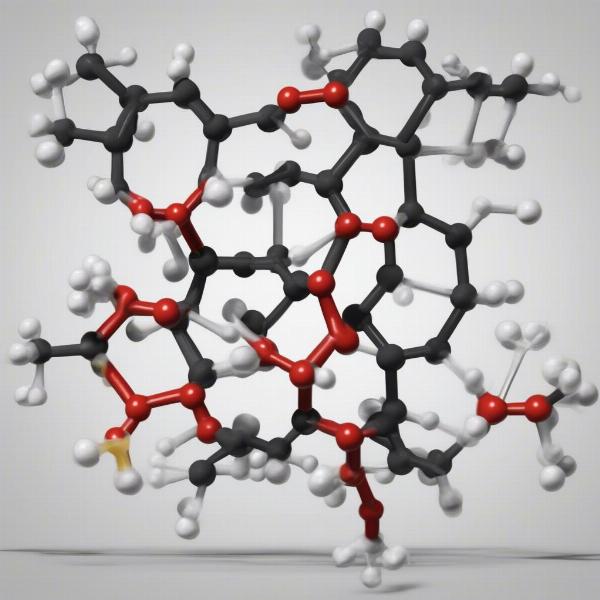Sucralose, commonly found in sugar-free products, has become a popular alternative to sugar for humans. But what about our furry friends? Can dogs eat sucralose safely, or should it be avoided entirely? This article dives deep into the topic, exploring the potential risks and benefits, providing pet owners with the information they need to make informed decisions about their dog’s diet.
Understanding Sucralose and its Effects on Dogs
Sucralose is a non-nutritive artificial sweetener, meaning it provides sweetness without adding calories. It’s created by chemically altering sugar molecules, making it approximately 600 times sweeter than regular sugar. While generally considered safe for human consumption, the effects of sucralose on dogs are less clear-cut. Some studies suggest that large amounts of sucralose can negatively impact a dog’s gut microbiome, potentially leading to digestive upset. However, the amounts used in most human foods are typically too small to cause significant issues in healthy dogs.
 Sucralose Molecule Structure
Sucralose Molecule Structure
Potential Risks of Sucralose for Dogs
While small amounts of sucralose are unlikely to cause serious harm, it’s important to be aware of the potential risks, especially for dogs with pre-existing health conditions. Dogs with diabetes, for example, should avoid sucralose as it can still affect blood sugar levels, even without contributing calories. Additionally, some dogs may be more sensitive to artificial sweeteners, experiencing gastrointestinal issues like diarrhea or vomiting even with small exposures.
Is Sucralose Poisonous to Dogs?
The question of whether sucralose is poisonous to dogs is complex. While it’s not considered acutely toxic in the same way that chocolate or xylitol is, excessive consumption can still lead to negative health consequences. Xylitol, another artificial sweetener, is incredibly toxic to dogs, even in small amounts, causing a dangerous drop in blood sugar and potentially liver failure. It’s crucial to distinguish between sucralose and xylitol, as they have vastly different effects on canine health. Sucralose, while not as dangerous, should still be consumed in moderation.
What to Do if Your Dog Eats Sucralose
If your dog accidentally ingests a small amount of sucralose, there’s usually no need for immediate panic. Monitor your dog for any signs of digestive upset, such as vomiting, diarrhea, or loss of appetite. If your dog consumes a large amount of sucralose, or if they exhibit any concerning symptoms, contact your veterinarian immediately. They can provide guidance and determine if any intervention is necessary.
Safer Sweet Treats for Your Canine Companion
Instead of risking potential issues with artificial sweeteners, opt for naturally sweet and dog-friendly treats like small pieces of fruits like apples (without the core and seeds) or bananas. Remember to offer these treats in moderation, as part of a balanced diet. Always prioritize your dog’s overall health and well-being when choosing snacks and treats.
Conclusion
While small amounts of sucralose are unlikely to be harmful to most dogs, it’s best to err on the side of caution and avoid it altogether. There are plenty of healthier alternatives available that won’t pose any potential risks to your furry friend’s health. Always prioritize a balanced diet and consult with your veterinarian if you have any concerns about your dog’s nutrition.
FAQ
-
What should I do if my dog ate something with sucralose? Monitor your dog for any signs of discomfort. If they ingested a large amount or show symptoms, contact your veterinarian.
-
Is sucralose the same as xylitol? No, sucralose and xylitol are different artificial sweeteners. Xylitol is highly toxic to dogs.
-
Are there any safe sweet treats for dogs? Yes, small amounts of fruits like apples (without core and seeds) or bananas can be given as occasional treats.
-
Can sucralose cause diabetes in dogs? No, sucralose doesn’t directly cause diabetes, but it can still impact blood sugar levels.
-
Can sucralose upset a dog’s stomach? Yes, some dogs are sensitive to artificial sweeteners and may experience digestive upset.
-
Is it okay to give my diabetic dog sucralose? No, avoid giving sucralose to diabetic dogs.
-
What are the symptoms of sucralose poisoning in dogs? While not acutely toxic, excessive sucralose can cause digestive issues like vomiting and diarrhea.
ILM Dog is your trusted resource for expert dog care advice and information. We offer comprehensive guides on dog breeds, health, training, nutrition, and much more. From puppy care to senior dog support, ILM Dog is here to help you navigate every stage of your dog’s life. Contact us today for personalized advice: Email: [email protected], Phone: +44 20-3965-8624. Visit our website for more helpful articles and resources: ILM Dog.